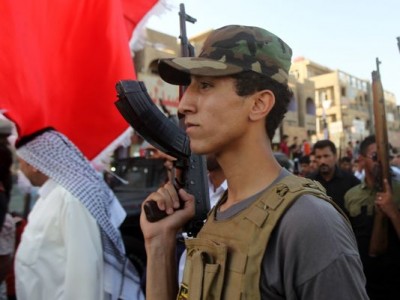
Fighters of the Islamic State of Iraq and al-Sham have been fighting to gain control of two major highways that lead from Sunni Muslim strongholds into Baghdad, where they have pledged to depose Iraqi Prime Minister Nouri al-Maliki and his Shiite-dominated government.
On Tuesday, however, forces loyal to Mr. Maliki repelled the militants’ attempt to capture Baquba, the capital of Diyala province and 38 miles north of Baghdad.
At least 28 rebels were killed in an attack on the city’s police station, said Abdul Amir Al Zaidi, head of the military command center in the province.
Government soldiers were moving through Baquba to root out ISIS fighters who had infiltrated the city, an Iraqi security source said.
Elsewhere in Iraq on Tuesday, government forces also were mounting an offensive to retake the strategic city of Tal Afar from ISIS militants.
ISIS fighters seized Tal Afar on Monday, as they continued their drive to link areas under their control on both sides of the Iraq-Syria frontier.
In Iraq, ISIS released a new an assassination video of an Iraqi soldier being assassinated. How are Iraq’s Shia responding to their country’s latest defeats and militant provocations? WSJ’s Jason Bellini has #TheShortAnswer.
A provincial official said Tuesday that the Iraqi military was using Tal Afar’s airport, its only foothold, to beef up government forces before they attempt to retake the city.
Up to 700 ISIS fighters—many of them armed with weapons they seized from government arsenals in the city of Mosul last week—were concentrated in the eastern part of Tal Afar, a city of about 200,000 people 37 miles east of Iraq’s border with Syria.
Government aircraft were conducting airstrikes against ISIS fighters controlling the city’s center, according to Tal Afar’s mayor, Abd Al Aal Abbas.
As Iraq’s military sought the initiative in Baghdad’s efforts to stem the insurgent tide, the Iraq crisis was bringing two longtime foes closer together.
A top State Department official discussed Iraq with Iranian diplomats, a senior U.S. official said late Monday, the most direct talks yet between Tehran and Washington on the issue. Iran has deployed forces to aid its Shiite ally.
The U.S.-Iranian meeting took place alongside international nuclear negotiations in Vienna, officials said. Deputy Secretary of State William Burns took part in a 2½-hour meeting with top Iranian and European Unionofficials on the nuclear negotiations.
Meanwhile, U.N. Secretary-General Ban Ki-moon on Tuesday urged Mr. Maliki to start political negotiations with rival ethnic and religious groups with the aim of creating a national governing alliance.
Mr. Maliki, who has been Iraq’s prime minister since 2006, has been accused of the minority Sunni and Kurdish politicians of furthering sectarian tensions in the nation by promoting hard-line Shiite politicians and military officers whose main credential is loyalty to him.
“The Iraqi government should have one state, whether it is Sunni, Shia or Kurds, they should be able to harmoniously live together,” Mr. Moon said in Geneva.
In Ankara, Turkish Prime Minister Recep Tayyip Erdogan said that 80 Turkish diplomatic personnel taken hostage last week in Mosul were safe and that the Foreign Ministry was watching their situation closely and in contact with “all involved parties.” The hostages were being held in an unknown location by ISIS fighters, Mr. Erdogan said.
Also on Tuesday, a criminal court in Ankara ordered a ban on all news reports and photographs regarding the hostage crisis, which brought withering criticism on the government from opposition parties less than two months from Turkey’s critical presidential elections.
The decision, which bans all news material regarding the crisis in print, on television or the Internet, was taken to protect the safety of the hostages, the state-run Anadolu news agency said.
WSJ

Leave a Reply
You must be logged in to post a comment.